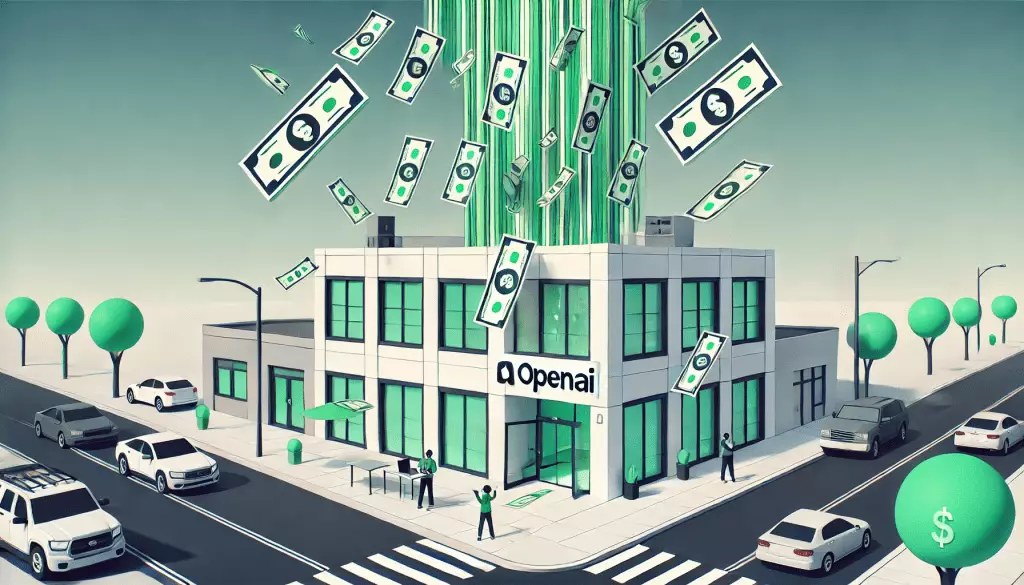OpenAI has recently made headlines by successfully securing an unprecedented $6.6 billion in its newest funding round, elevating its total valuation to a staggering $157 billion. This round is notable not only for the sheer volume of investment but also for its status as the largest venture capital round in history. Several influential investors, including Thrive Capital, Nvidia, and Microsoft, have contributed to this financial boost. With more than 250 million weekly unique users engaging with ChatGPT, OpenAI is positioned to leverage these funds to further enhance its standing in the competitive field of artificial intelligence (AI).
The implications of this funding are vast. OpenAI aims to strengthen its leading position in frontier AI research, expand its computational resources, and develop new tools to address complex challenges faced by individuals and businesses alike. However, amidst this financial triumph, skepticism lingers. Critics suggest that OpenAI’s decision to attract substantial investments from entities like the Softbank Venture Fund could signify troubling financial dependencies, particularly given Softbank’s historical portfolio filled with high-risk investments.
The criticisms surrounding OpenAI’s reliance on direct subscriptions for ChatGPT, rather than diversifying its revenue streams through API sales or licensing, raise vital questions about its long-term sustainability as a for-profit entity. These concerns are further accentuated by the resignation of key executive figures, including former CTO Mira Murati, which could undermine investor confidence. Notably, Apple’s choice to withdraw its investment considerations serves as a potential warning sign amidst a climate marked by careful scrutiny of tech giants.
Industry experts have pointed out that such decisions may reflect deeper issues within OpenAI’s operational strategies, particularly concerning its positioning against emergent rivals like Anthropic and Elon Musk’s xAI. The latter has notably ramped up its capabilities, recently unveiling a formidable supercluster for training, which signifies a thorough commitment to advancing competitive AI technology. Musk, ever the outspoken critic, has labeled OpenAI as “evil,” putting the company’s ethics and intents into sharp focus.
The landscape of AI is marked by rapid advancements, with the emergence of numerous new models challenging OpenAI’s supremacy. Companies like Google, Liquid AI, Meta, and Alibaba are introducing innovative tools and open-source models, garnering attention and widespread adoption. The competition is further complicated by ongoing efforts from established models like OpenAI’s, which often respond to challenges with updates or new releases designed to reclaim attention and usage among developers and consumers alike.
Despite these challenges, OpenAI currently leads in third-party performance benchmarks. The company’s strategy of rolling out expansive updates and new offerings like the o1 preview series has helped it maintain a competitive edge thus far. This rapid iterative process showcases OpenAI’s agility but also hints at the pressure it faces to stay ahead of an increasingly sophisticated array of contenders.
As OpenAI revels in its recent financial success, the outlook for developer partnerships seems promising. The investment influx is anticipated to stabilize OpenAI’s operations, thus fostering an environment where developers can confidently integrate AI models into their products. This aspect of OpenAI’s business is critical, as it forms the backbone of its continued relevance in the tech ecosystem.
However, the upcoming potential payout structure for custom GPT creators remains a significant point of interest. Since the introduction of the Custom GPT Store, community members have questioned how profit-sharing mechanisms will be implemented. Following CEO Sam Altman’s comments regarding future revenue sharing, many creators are watching closely for updates that could result in additional financial benefits for their contributions. The anticipation of these developments emphasizes the vital link between user engagement and OpenAI’s profitability.
OpenAI’s recent funding achievement represents a pivotal moment in its journey, providing necessary resources to navigate an increasingly competitive landscape. While it enjoys a current position of strength, the company must also address growing skepticism among critics and manage its relationships with investors and developers judiciously. Moving forward, sustaining growth amidst emergent competition will require agility, innovation, and a commitment to ethical operations. As the AI market continues to evolve, OpenAI’s ability to adapt to emerging trends and the demands of its users will ultimately determine its place in the future of tech innovation. As the industry watches closely, the stakes for OpenAI remain higher than ever.


Leave a Reply